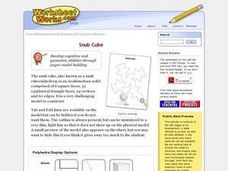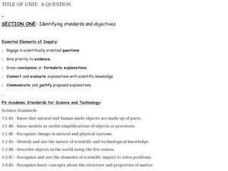Curated OER
How Does Matter Change State?
In this states of matter worksheet, students will write 2 things that cause matter to change state. Then, students will write in the effect that cause has on the state of matter.
Curated OER
Unit Cubes
In this unit cube learning exercise, students solve 3 different problems that contain various parts to each of them. First, they write as many 3-digit numbers as they can given the numbers 2, 3, 5, and 7. Then, students count how many...
Curated OER
Measuring Liquid Volume & Reading Thermometers
In this liquid volume worksheet, students first practice measuring liquid volume by determining what volume is indicated on each of the graduated cylinders in milliliters for the first nine problems. Then they determine the temperature...
Curated OER
Freezing and Boiling Point
In this freezing and boiling point graph worksheet, learners use the graph illustrated to respond to several questions that follow. They identify what is the freezing, boiling, and melting point of the substance in the graph. Students...
Curated OER
Volumes of Solids of Revolution
In this volumes of solids worksheet, students determine the volume of a solid of revolution by using the disk/washer method or the shell method. Explanations and examples are given prior to the exercise. This one-page worksheet contains...
Curated OER
Snub Cube
In this math worksheet, students create a paper model of a snub cube. It is an Archimedean solid comprised of 6 square faces, 32 equilateral triangle faces, 24 vertices and 60 edges.
Curated OER
Brain POP - States of Matter
In this states of matter worksheet, students visit the website http://www.brainpop.com/science/matter and watch a movie to complete 7 fill in the blank questions, 5 matching questions, and an 18 clue crossword.
Curated OER
5th Foss M&s Word Search Puzzle
In this properties and characteristics of substance activity, students review and study six key terms associated with matter and then locate those six terms in a word search puzzle.
Curated OER
It’s a Matter of Change
In this chemistry worksheet, students identify and describe the differences between solids and liquids. They respond to six questions related to matter and then, draw their favorite one.
Curated OER
Volumes of Solids of Revolution (Disk Method)
Students investigate the concept of computing the volume of solids of revolution using the disk method. The lesson requires some access to the Wood Shop to construct needed materials. It includes example problems for the teacher to use.
Curated OER
Oobleck
First graders explore Oobleck. They manipulate and observe the properties of Oobleck. Students discuss the differences between solids and liquids. They investigate Oobleck. Students write a sentence describing what they observed about...
Curated OER
Introduce Solids
Students identify and interpret a variety of solid materials - cloth, wood, metal, plastic, paper, and rubber. After a period of free exploration, they then describe the properties of the objects and develop vocabulary in order to...
Curated OER
Solids and Water
Students investigate mixtures made of water and familiar solid materials. They observe and discuss the changes that occur immediately and set the mixtures aside for a day. Finally, students observe the mixtures, note changes, and graph...
Curated OER
Solid, Liquid, Gas!
Students determine the properties of the solids, liquids, and gases, and how they can recognize those properties by observing a teacher demonstration. Next, they experiment with at mystery matter that looks like a liquid but that takes...
Curated OER
Volume of Solids
Students engage in a lesson that is concerned with finding the volume of a solid. They investigate and describe the characteristics of a favorite food and identify it as metal or non-metal. The lesson includes pictures of different solid...
Curated OER
Strange States of Matter
Fourth graders explore objects that do not fit into the categories given by three states of matter. They explore why an object doesn't fit perfectly into one of the three categories. Students observe the properties of Oobleck. They...
Curated OER
Science: Identifying Properties of Matter
Students observe a demonstration of the the three forms of matter - air, water, and solids - in plastic bags. After discussing the properties, they transfer them to a Venn diagram. Finally, students identify five items in the classroom...
Curated OER
TIN CAN TREAT
Students conduct an experiment where they will change a liquid dairy product into a solid. They review the definitions of liquids and solids. Students are given an example of each. They are divided into groups of four, each group is...
Curated OER
Solids, Liquids, and Gases
Students explore the three main forms of matter: solid, liquid, and gas. They examine concrete examples of each, using their five senses and "experimenting" to find differences in them. They find pictures of each, cut them out and past...
Curated OER
A Matter of Fact
Third graders define matter as anything that takes up space and has mass, recognize, through experimentation and observation, that matter exists in three forms, including solid, liquid, and gas, and discuss characteristics of each form...
Curated OER
How Does a Liquid Become a Solid?
Students explore the energy changes from a liquid to a solid. They model the arrangement of a solid and the change in states due to changes in energy using desks and chairs. Assessment questions are provided in lesson plan.
Curated OER
Water: Liquid or Solid?
First graders investigate how water can be both a liquid and a solid. They weigh popsicles and observe them as they write in their science journals. They measure the liquid as the popsicle melts and refreeze them to change them back...
Curated OER
Density of Solids and Liquids
Students calculate the density of regular and irregular solids and liquids. They relate the term dense to science as well as its literal meaning that society uses it as everyday. A worksheet is completed on density.
Curated OER
A QUESTION
Students engage in scientifically oriented questions. They give priority to evidence, draw conclusions/formulate explanations and connect/evaluate explanations with scientific knowledge. Students communicate and justify proposed...

























